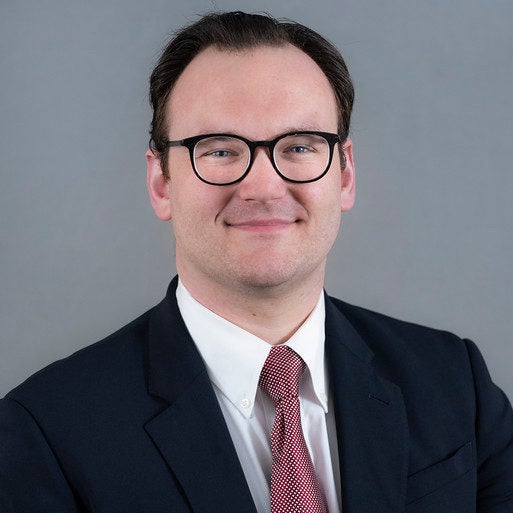By Hugh Verrier, J.D. ’22

As I finish up my third year of law school, I find myself reflecting on the lessons of my legal education. I feel very fortunate to have taken a wide variety of fascinating classes, covering a diverse range of practice areas and bodies of law. Many of these courses were formative, even when I least expected them to shape my broader views of the legal profession. Classes about niche or technical issues have developed my more general understanding of what the law can and should be. And these experiences have led me to good professors and mentors – people who helped me refine my approach to the questions confronting every lawyer and law student. What kind of lawyer do I want to be? What does it mean to be a good person in the practice of law? And how does that relate to the adversarial system, and the lawyer’s duty to be an effective advocate for their clients?
As a law student, my clinical experiences have given me unique opportunities to engage with these questions, often in ways that cannot be replicated in the classroom. Therefore, I am particularly grateful to have been able to finish my 3L year by participating in the Judicial Process in Trial Courts Clinic. Aside from being rewarding and formative in its own right, spending my last semester working in a judge’s chambers has provided me with a unique opportunity to consider the lessons of my legal education, as well as the application of those lessons to my future career.
Upon joining the clinic, Judge Cratsley asked us to rank our choices of judge for placement. I specifically requested a magistrate judge, for two reasons. First, over the course of my summer internships, I had gained an appreciation for the amount of lawyering that takes place before magistrate judges, as well as the number of cases that resolve at that stage of litigation. Second, I believed that working with a magistrate judge would provide me with greater exposure to the intricacies of pre-trial motions and procedure; I reasoned that these skills would be critical if I wanted to pursue a career in litigation.
As a result of my preferencing, I was placed with Magistrate Judge Donald Cabell at the United States District Court for the District of Massachusetts. Interning with Judge Cabell was a wonderful professional experience. It exposed me to the extraordinary effort and care that goes into judicial deliberation, and I learned a lot about the intricacies of trial advocacy. And Judge Cabell always made himself available to his interns, even during our busiest weeks. He would take the time to explain substantive and procedural issues to us, and he genuinely valued our perspectives. In each hearing and mediation, he made sure to ask for our opinions, and he always included us in his private deliberations. Those discussions were one of the most memorable parts of my time as a law student.
At a pedagogical level, my clinical experiences have taught me an immense amount about practical lawyering. I have had many opportunities to work directly with both Judge Cabell and his clerks on projects and writing assignments; that work has helped me improve my legal research, writing, and reasoning. I have also learned a lot about working in a team, which can be difficult to pick up in a classroom – skills like communication, organization, and collaboration. It is one thing to find good case law, but it is another entirely to explain the relevance of a case clearly and concisely.
In a similar way, I have also learned from my exposure to the lawyering of the advocates who appeared before Judge Cabell. I benefited immensely from reading briefs, observing oral arguments, and participating in mediations; these experiences helped me appreciate the ways that the nuances of presentation and delivery can distinguish attorneys and serve clients.
Taken altogether, my experiences in Judge Cabell’s chambers have deepened my respect for the legal profession, giving me a greater appreciation for the role of litigators in the vindication of individual rights – as well as strong admiration for the sensitivity and care that goes into judicial decision-making.
On the classroom side, I learned a lot from our seminar discussions and assignments. The readings struck a good balance between practical and philosophical considerations; they provided insights into both the mechanics and the normative underpinnings of the judicial process. Topics ranged from plea bargaining to judicial ethics, restorative justice, and sentencing. Judge Cratsley and Professor Berenson put great effort into leading our discussions and helping us to engage with the important questions raised by our assignments. Their work inspired participation and engagement, and there was a good sense of comradery among students in the clinic. These discussions also benefited from the participation of fantastic guest speakers, who added to our classes by reflecting on their experiences and sharing their insights into the judicial process. Finally, the reflection papers were also valuable; they provided us with opportunities to discuss deeper jurisprudential and procedural issues with our judges.
As I finish this clinic and my final year of law school, I have no doubt that my experiences with Judge Cabell will enhance my career as a lawyer. I have learned a lot about the practical dimensions of legal work, as well the procedural and substantive dimensions of trial advocacy. I am grateful to Judge Cratsley and Professor Berenson for a great semester, and I am especially grateful to Judge Cabell and his clerks for the time and effort they put into helping me develop as a law student and future litigator. I think clinical work is a critical part of legal education, and I strongly recommend this clinic.
Filed in: Clinical Student Voices
Tags: Class of 2022, Judicial Process in Trial Courts Clinic
Contact Office of Clinical and Pro Bono Programs
Website:
hls.harvard.edu/clinics
Email:
clinical@law.harvard.edu